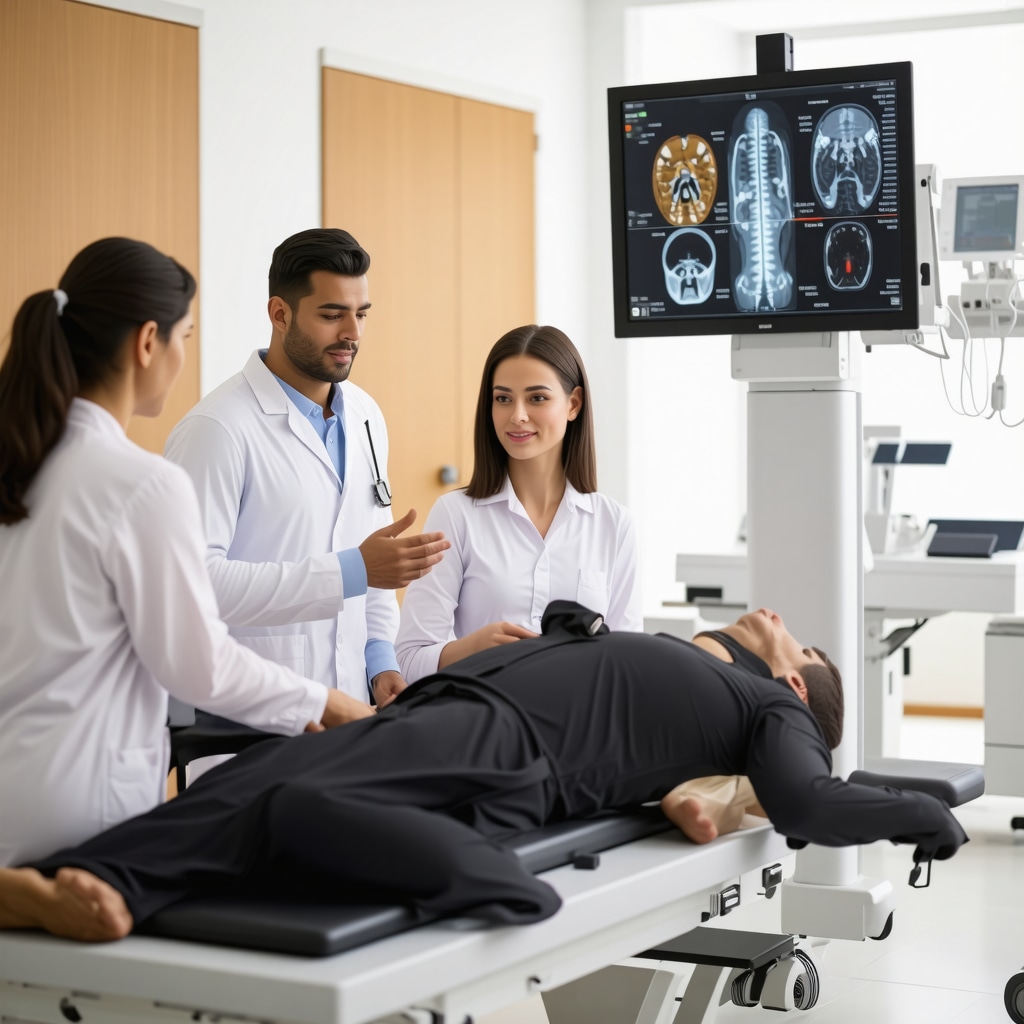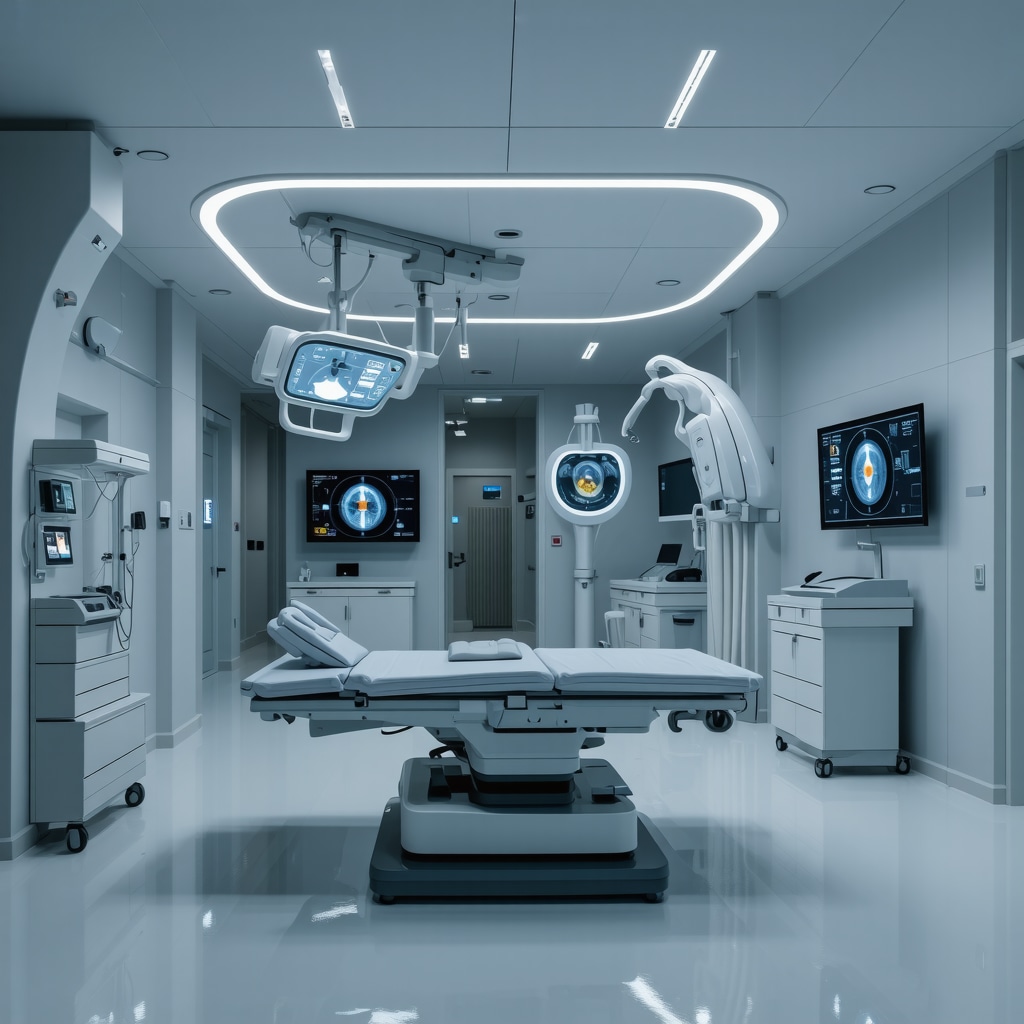Unlocking the Secrets to Choosing the Right Personal Injury Orthopedic Specialist in New Jersey
In the aftermath of a personal injury, the path to recovery can feel overwhelming. Entrusting your care to the right orthopedic doctor is crucial—not only for healing but also for navigating the complexities of treatment and insurance claims. New Jersey’s healthcare landscape offers many orthopedic specialists, but how do you discern the perfect fit for your injury and unique situation? This guide dives deep into expert strategies that empower you to make informed decisions, ensuring your orthopedic care is both effective and supportive.
Why Specialized Personal Injury Orthopedic Care Makes All the Difference
Orthopedic doctors skilled in personal injury cases understand the intricate link between trauma and musculoskeletal damage. Their expertise goes beyond general orthopedic knowledge; they are adept at diagnosing subtle injury patterns common in auto accidents, slips, and falls. For example, a patient experiencing persistent back pain after a car collision may initially receive generic treatment that overlooks a herniated disc, delaying recovery. Personal injury orthopedic specialists in NJ are equipped to identify such nuances early, tailoring treatment plans that combine medical precision with legal awareness.
Decoding Credentials: What to Look for in an NJ Orthopedic Doctor After Injury
When selecting a personal injury orthopedic doctor in New Jersey, credentials matter profoundly. Beyond board certification in orthopedic surgery, seek doctors with additional fellowship training in trauma or spine care. Their experience with workers’ compensation and auto accident cases can streamline your treatment and documentation processes. Moreover, familiarity with orthopedic medical liens—which allow treatment without upfront payment pending legal claims—can be a game-changer in managing your care stress-free. Resources like this detailed guide provide insights into how these financial arrangements work within NJ’s legal framework.
How Can You Ensure Your Orthopedic Doctor Aligns With Your Injury’s Specific Needs?
This critical question often determines the trajectory of your recovery journey.
Begin by evaluating the orthopedic doctor’s specialization relative to your injury. For spine-related trauma, a doctor with expertise in spinal disorders or a top orthopedic spine specialist—such as those highlighted in this trusted NJ resource—can make a significant difference. Engage in a thorough consultation where you discuss your injury history, symptoms, and treatment goals. Ask about their approach to minimally invasive treatments, which often result in faster recovery and less postoperative pain, as explained in this expert overview.
Navigating the NJ Healthcare System: Practical Tips for Personal Injury Patients
Understanding how orthopedic care intersects with personal injury claims in New Jersey is vital. Timely medical documentation from your orthopedic doctor can influence the success of your legal case. Therefore, selecting a doctor who collaborates closely with legal professionals and is experienced in injury claim documentation is beneficial. Consider doctors who facilitate direct communication with your attorney and insurance providers, helping you avoid procedural delays. For actionable tips on maximizing your orthopedic care post-injury, explore this comprehensive guide.
Empowering Your Recovery: When and How to Advocate for Specialist Care
Recovery is not just passive healing but active advocacy. If your symptoms persist or worsen despite initial treatment, don’t hesitate to seek a second opinion or request referral to a sub-specialist, such as a spine surgeon or neurologist. Early recognition of red flags—like neurological deficits or unrelenting pain—can prevent long-term disability. In NJ, resources are available to help you identify when escalation to specialized care is warranted, as detailed in this expert advice.
Have you recently experienced a personal injury and are navigating the complexities of orthopedic care? Share your questions or experiences in the comments below to learn from a community dedicated to informed recovery.
For further authoritative insights on orthopedic injury management, visit the American Academy of Orthopaedic Surgeons at AAOS.org.
Understanding the Role of Orthopedic Therapy in Your Recovery Journey
From my own experience and countless stories shared by patients, one thing stands out: the journey to recovery after a personal injury isn’t just about surgery or medications. Orthopedic therapy plays a pivotal role in restoring function, reducing pain, and rebuilding strength. When I first faced my back injury, I was skeptical about therapy sessions, thinking they might be tedious or ineffective. But once I committed to a customized rehab plan, I noticed gradual improvements that no pill or injection could provide.
Therapists trained in orthopedic rehabilitation not only focus on physical recovery but also educate patients about body mechanics and injury prevention. This proactive approach can drastically reduce the chance of future problems. If you want to explore this further, check out these expert rehab tips after lumbar fusion surgery, which highlight the importance of guided therapy in complex spine cases.
Balancing Non-Surgical and Surgical Options: What Should You Consider?
One question I often hear from others facing orthopedic injuries is: “When is surgery truly necessary, and when can non-surgical care suffice?” This is a critical decision that depends on many factors, including injury severity, patient health, and personal goals. My own journey involved exploring non-surgical options extensively before my orthopedic specialist recommended a minimally invasive procedure.
Minimally invasive back pain treatments, as detailed in this insightful resource, often offer faster recovery times and reduced risks compared to traditional surgery. However, these treatments require a specialist with precise expertise to evaluate candidacy. It’s crucial to have open discussions with your doctor about all available options, expected outcomes, and recovery timelines.
How Can You Empower Yourself to Make the Best Orthopedic Treatment Decisions?
In my experience, knowledge is empowerment. When I was deciding on my treatment path, I made it a point to research, ask detailed questions, and seek second opinions. Don’t hesitate to inquire about your doctor’s approach to diagnostics—such as when to request an MRI instead of an X-ray, which can be vital in uncovering hidden injuries. For example, this guide offers excellent advice on imaging choices that can influence your diagnosis and treatment.
Also, understanding the pros and cons of interventions like steroid injections, physical therapy, or surgery can help you align treatment with your lifestyle and expectations. The American Academy of Orthopaedic Surgeons emphasizes patient education as a key factor in successful outcomes, which resonated deeply with me during my recovery.
Listening to Your Body: The Subtle Signs That Demand Attention
One thing I’ve learned is how important it is to pay attention to subtle but persistent symptoms. Symptoms such as ongoing numbness, weakness, or pain that worsens over time shouldn’t be ignored. Early intervention can prevent chronic issues and improve your quality of life dramatically. When I noticed my symptoms intensifying, I promptly sought re-evaluation, which changed my treatment trajectory for the better.
If you’re unsure whether your symptoms warrant escalation to a spine surgeon or a specialized orthopedic doctor, resources like this expert advice offer clear guidelines tailored specifically for NJ patients.
Have you experienced challenges navigating orthopedic care after an injury? What questions or concerns have shaped your journey? Please share your experiences or ask questions in the comments below — your story could help others facing similar hurdles.
Leveraging Cutting-Edge Diagnostic Technologies to Pinpoint Complex Orthopedic Injuries
In the realm of personal injury orthopedics, precision in diagnosis sets the foundation for successful treatment outcomes. Traditional imaging techniques like X-rays provide initial insights, but advanced modalities such as MRI, CT scans, and ultrasound have revolutionized injury assessment. These technologies enable detection of soft tissue damage, subtle fractures, and nerve involvement that might otherwise go unnoticed. For instance, MR neurography, a specialized form of MRI, can visualize nerve pathologies critical in cases of radiculopathy or peripheral nerve injuries common after traumatic incidents.
New Jersey orthopedic specialists increasingly incorporate these state-of-the-art diagnostics into their evaluation protocols, ensuring tailored, evidence-based interventions. A comprehensive diagnostic approach not only accelerates recovery but also strengthens legal documentation by providing objective evidence of injury severity and complexity. The American Academy of Orthopaedic Surgeons highlights the importance of using advanced imaging judiciously to prevent both under- and over-treatment (AAOS Research & Publications).
Integrating Multidisciplinary Orthopedic Care: Beyond Surgery and Traditional Therapy
Orthopedic recovery after personal injury often benefits from an interdisciplinary approach that transcends surgical procedures and physical therapy alone. Incorporating pain management specialists, occupational therapists, and even psychological support can dramatically improve patient outcomes. Chronic pain and post-injury anxiety or depression frequently co-occur, influencing rehabilitation trajectories and patient adherence.
Specialists in New Jersey’s personal injury clinics are pioneering integrated care models that synchronize orthopedic treatment with behavioral health and pain modulation strategies. Techniques such as cognitive-behavioral therapy (CBT) for pain coping and neuromodulation therapies are examples of cutting-edge adjuncts enhancing traditional rehabilitation. This holistic care paradigm addresses not only the physical but also the psychosocial dimensions of recovery, leading to more sustainable functional restoration.
What Advanced Orthopedic Treatment Modalities Are Emerging for Complex Personal Injury Cases?
Emerging treatments for complex musculoskeletal injuries include biologic therapies like platelet-rich plasma (PRP), stem cell injections, and regenerative medicine approaches that aim to accelerate tissue healing and reduce inflammation. These therapies are gaining traction in NJ orthopedic practices due to their potential to minimize invasive surgeries and enhance natural repair mechanisms. However, patient selection and timing are critical, necessitating consultation with specialists well-versed in these modalities.
Moreover, computer-assisted surgical navigation and robotic-assisted procedures are enhancing surgical precision, reducing operative times, and improving postoperative recovery. These technologies exemplify how orthopedic care is evolving to meet the nuanced demands of personal injury patients.
For patients seeking to explore these advanced options, engaging with orthopedic specialists who maintain affiliations with academic medical centers or research institutions can provide access to clinical trials and novel therapies.
Empowering You to Maximize Recovery: Personalized Orthopedic Care Plans and Continuous Monitoring
Crafting an individualized orthopedic care plan is paramount, considering the unique injury characteristics and patient lifestyle factors. Continuous monitoring through wearable technology and telemedicine consultations is transforming how recovery progress is tracked and adjusted in real time. These tools facilitate early identification of setbacks and enable prompt modifications to therapy regimens, optimizing healing trajectories.
Patients are encouraged to actively participate in their care by utilizing digital health platforms offered by many NJ orthopedic practices. This engagement fosters transparency, enhances communication with providers, and supports shared decision-making—a cornerstone of modern orthopedic care.
If you’re navigating the complexities of orthopedic treatment after a personal injury, consider seeking specialists who integrate these advanced diagnostics, interdisciplinary approaches, and personalized care technologies.
Curious about how emerging orthopedic diagnostics and therapies can accelerate your recovery? Connect with New Jersey’s top personal injury orthopedic experts today to explore tailored treatment options.

Harnessing Data-Driven Orthopedic Outcomes: The Future of Personalized Treatment
Modern orthopedic care increasingly leverages big data analytics and machine learning to predict patient-specific recovery trajectories and optimize treatment plans. New Jersey specialists are beginning to utilize predictive modeling tools that analyze variables such as injury type, patient demographics, and treatment response history to tailor interventions with unprecedented precision. These data-driven insights facilitate proactive adjustments, minimizing complications and enhancing functional restoration.
Exploring the Role of Teleorthopedics: Revolutionizing Access and Continuity of Care
Teleorthopedics, the use of telemedicine technologies for orthopedic consultations and follow-ups, has emerged as a vital modality especially for personal injury patients facing mobility challenges or geographic barriers in New Jersey. This approach enables real-time symptom monitoring, virtual physical assessments, and timely intervention without the constraints of in-person visits. It also fosters multidisciplinary collaboration by integrating specialists remotely, thus expediting decision-making and care coordination.
How Can Teleorthopedics Enhance Personalized Rehabilitation for Complex Orthopedic Injuries?
Teleorthopedics facilitates customized rehabilitation plans through interactive video sessions, remote progress tracking, and digital exercise monitoring, ensuring adherence and immediate feedback. Patients recovering from intricate injuries benefit from continuous professional guidance, reducing risk of setbacks and empowering self-management. Additionally, telehealth platforms often incorporate AI-driven alerts for symptom exacerbation, prompting prompt clinical review. This dynamic care model exemplifies the future of orthopedic recovery by combining convenience with clinical rigor.
Authoritative Insight: Integrating Evidence-Based Innovations in Orthopedic Trauma Care
The National Center for Biotechnology Information (NCBI) provides extensive peer-reviewed research on the efficacy of emerging orthopedic technologies and therapies in trauma management. Their comprehensive reviews underscore the value of combining biologic treatments, advanced imaging, and telemedicine to optimize outcomes in complex injury cases, reinforcing the importance of multidisciplinary and technologically integrated approaches.
Ready to elevate your recovery with cutting-edge orthopedic care? Connect with New Jersey’s leading personal injury orthopedic specialists who embrace innovation and personalized strategies to accelerate your healing journey.

Frequently Asked Questions (FAQ)
What qualifications should I look for in a personal injury orthopedic specialist in New Jersey?
Seek board certification in orthopedic surgery along with fellowship training in trauma or spine care. Experience with personal injury cases, knowledge of workers’ compensation, and familiarity with orthopedic medical liens are also critical for effective treatment and financial navigation.
How soon after a personal injury should I consult an orthopedic specialist?
Early consultation is advisable, especially if you experience persistent pain, numbness, or weakness. Prompt evaluation helps identify hidden injuries and initiates timely treatment, which can prevent complications and support legal claims.
When is surgery necessary versus non-surgical treatment for orthopedic injuries?
Surgical intervention depends on injury severity, patient health, and response to conservative measures. Minimally invasive procedures may be recommended when non-surgical options like physical therapy or injections fail to provide relief or when structural damage requires correction.
What advanced diagnostic tools are used to assess complex personal injury orthopedic cases?
Besides X-rays, specialists use MRI, CT scans, ultrasound, and MR neurography to detect soft tissue damage, nerve involvement, and subtle fractures. These tools enhance diagnostic accuracy and guide personalized treatment plans.
How can teleorthopedics improve my recovery experience?
Teleorthopedics offers convenient virtual consultations, remote monitoring, and interactive rehabilitation, especially useful for patients with mobility challenges. It ensures continuous care, timely adjustments, and multidisciplinary collaboration without frequent in-person visits.
What role does multidisciplinary care play in orthopedic recovery after personal injury?
Integrating pain management, occupational therapy, psychological support, and orthopedic treatment addresses both physical and psychosocial aspects of recovery, improving outcomes and reducing chronic pain or disability risks.
Are emerging therapies like PRP or stem cell injections effective for personal injury recovery?
Biologic therapies show promise in accelerating healing and reducing inflammation but require careful patient selection and timing. Consulting specialists experienced in these modalities is essential to assess suitability and potential benefits.
How important is continuous monitoring during orthopedic recovery?
Continuous monitoring using wearable technology and telemedicine enables early detection of setbacks and allows for real-time adjustments to treatment, optimizing healing and preventing complications.
Can orthopedic specialists in New Jersey assist with legal and insurance processes?
Yes, many specialists collaborate closely with legal professionals, provide thorough medical documentation, and understand orthopedic medical liens, facilitating smoother claim processes and financial management.
What signs indicate I should seek a second opinion or specialist referral?
Persistent or worsening symptoms such as unrelenting pain, neurological deficits, or limited function warrant re-evaluation or referral to sub-specialists like spine surgeons to prevent long-term disability.
Trusted External Sources
American Academy of Orthopaedic Surgeons (AAOS): A leading authority providing comprehensive education, research, and clinical guidelines on orthopedic injury management, surgical techniques, and rehabilitation.
National Center for Biotechnology Information (NCBI): Offers extensive peer-reviewed research articles on emerging orthopedic technologies, biologic therapies, and evidence-based trauma care approaches.
New Jersey Orthopedic Association: Local professional body featuring expert directories, treatment innovations, and resources tailored to New Jersey’s healthcare and legal landscape.
Centers for Disease Control and Prevention (CDC) – Injury Prevention & Control: Provides statistical data, prevention strategies, and best practices relevant to personal injury and musculoskeletal trauma.
Journal of Orthopaedic Trauma: Publishes cutting-edge clinical studies and reviews focused on trauma-related orthopedic interventions and outcomes, valuable for understanding advanced care options.
Conclusion
Choosing the right personal injury orthopedic specialist in New Jersey is a pivotal step toward effective recovery and legal resolution. Expertise in trauma-specific care, advanced diagnostics, multidisciplinary approaches, and familiarity with the state’s unique legal and insurance frameworks are essential considerations. Embracing innovations such as teleorthopedics, biologic therapies, and data-driven treatment plans empowers patients to navigate their recovery with confidence and precision. Remember, attentive symptom monitoring and proactive advocacy enhance outcomes significantly.
We encourage you to apply these expert insights to your own recovery journey, engage actively with your healthcare providers, and share your experiences. Explore related expert content and reach out to trusted New Jersey orthopedic specialists to access personalized, cutting-edge care that aligns with your goals.

